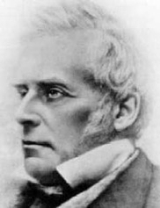
John Nelson Darby
Overview
Anglo-Irish
Anglo-Irish was a term used primarily in the 19th and early 20th centuries to identify a privileged social class in Ireland, whose members were the descendants and successors of the Protestant Ascendancy, mostly belonging to the Church of Ireland, which was the established church of Ireland until...
evangelist
Evangelism
Evangelism refers to the practice of relaying information about a particular set of beliefs to others who do not hold those beliefs. The term is often used in reference to Christianity....
, and an influential figure among the original Plymouth Brethren
Plymouth Brethren
The Plymouth Brethren is a conservative, Evangelical Christian movement, whose history can be traced to Dublin, Ireland, in the late 1820s. Although the group is notable for not taking any official "church name" to itself, and not having an official clergy or liturgy, the title "The Brethren," is...
. He is considered to be the father of modern Dispensationalism
Dispensationalism
Dispensationalism is a nineteenth-century evangelical development based on a futurist biblical hermeneutic that sees a series of chronologically successive "dispensations" or periods in history in which God relates to human beings in different ways under different Biblical covenants.As a system,...
. He produced a translation of the Bible
Bible
The Bible refers to any one of the collections of the primary religious texts of Judaism and Christianity. There is no common version of the Bible, as the individual books , their contents and their order vary among denominations...
based on the Hebrew and Greek texts called The Holy Scriptures: A New Translation from the Original Languages by J. N. Darby
Darby Bible
The Darby Bible refers to the Bible as translated from Hebrew and Greek by John Nelson Darby. Darby published a translation of the New Testament in 1867, with revised editions in 1872 and 1884...
.
John Nelson Darby was born in Westminster
City of Westminster
The City of Westminster is a London borough occupying much of the central area of London, England, including most of the West End. It is located to the west of and adjoining the ancient City of London, directly to the east of the Royal Borough of Kensington and Chelsea, and its southern boundary...
, London
London
London is the capital city of :England and the :United Kingdom, the largest metropolitan area in the United Kingdom, and the largest urban zone in the European Union by most measures. Located on the River Thames, London has been a major settlement for two millennia, its history going back to its...
, and christened at St. Margaret's
St. Margaret's, Westminster
The Anglican church of St. Margaret, Westminster Abbey is situated in the grounds of Westminster Abbey on Parliament Square, and is the parish church of the House of Commons of the United Kingdom in London...
on 3 March 1801. He came from an Anglo-Irish landowning family seated at Leap Castle
Leap Castle
Leap Castle is an Irish castle in County Offaly, about four miles north of the town of Roscrea on the R421. It was built in the late 15th century by the O'Bannon family and was originally called "Léim Uí Bhanáin," or "Leap of the O'Bannons." The O'Bannons were the "secondary chieftains" of the...
, King's County, Ireland. He was the nephew of Admiral Henry D'Esterre Darby
Henry D'Esterre Darby
Admiral Sir Henry D'Esterre Darby, KCB, was an officer in the Royal Navy. He was the second son of Jonathan Darby IV Esq., of Leap Castle, in King's County, Ireland. He was the nephew of Vice Admiral George Darby...
and his middle name was given in recognition of his godfather and family friend, Lord Nelson.
Darby was educated at Westminster School
Westminster School
The Royal College of St. Peter in Westminster, almost always known as Westminster School, is one of Britain's leading independent schools, with the highest Oxford and Cambridge acceptance rate of any secondary school or college in Britain...
and Trinity College, Dublin
Trinity College, Dublin
Trinity College, Dublin , formally known as the College of the Holy and Undivided Trinity of Queen Elizabeth near Dublin, was founded in 1592 by letters patent from Queen Elizabeth I as the "mother of a university", Extracts from Letters Patent of Elizabeth I, 1592: "...we...found and...
where he graduated Classical Gold Medallist in 1819.

